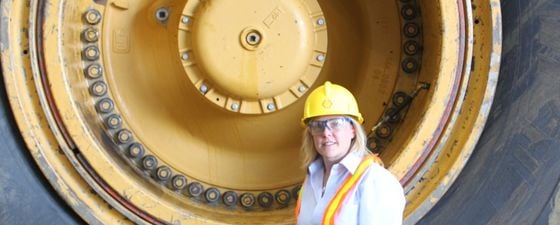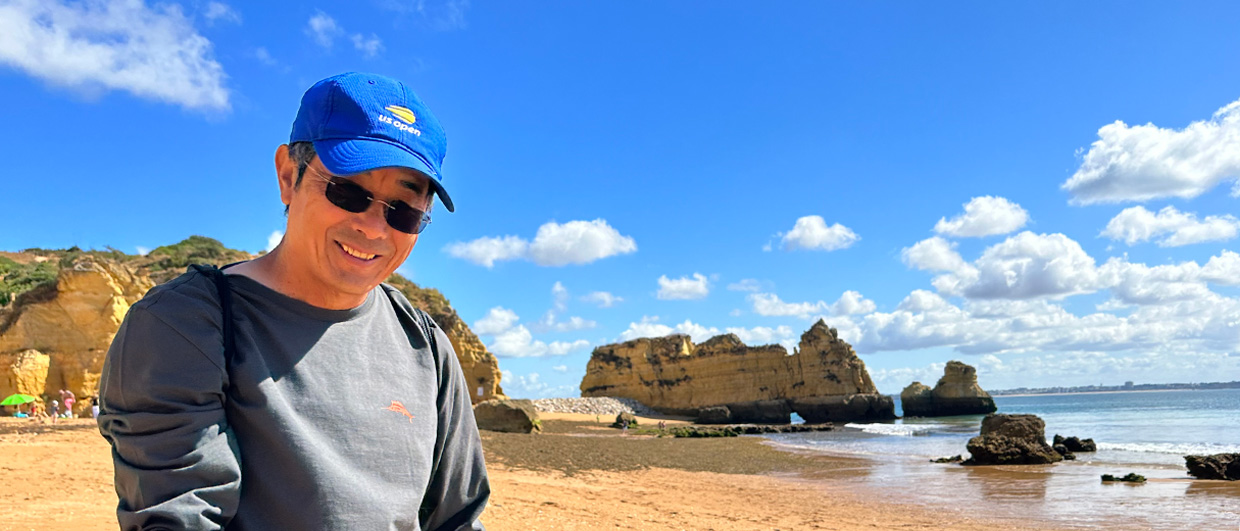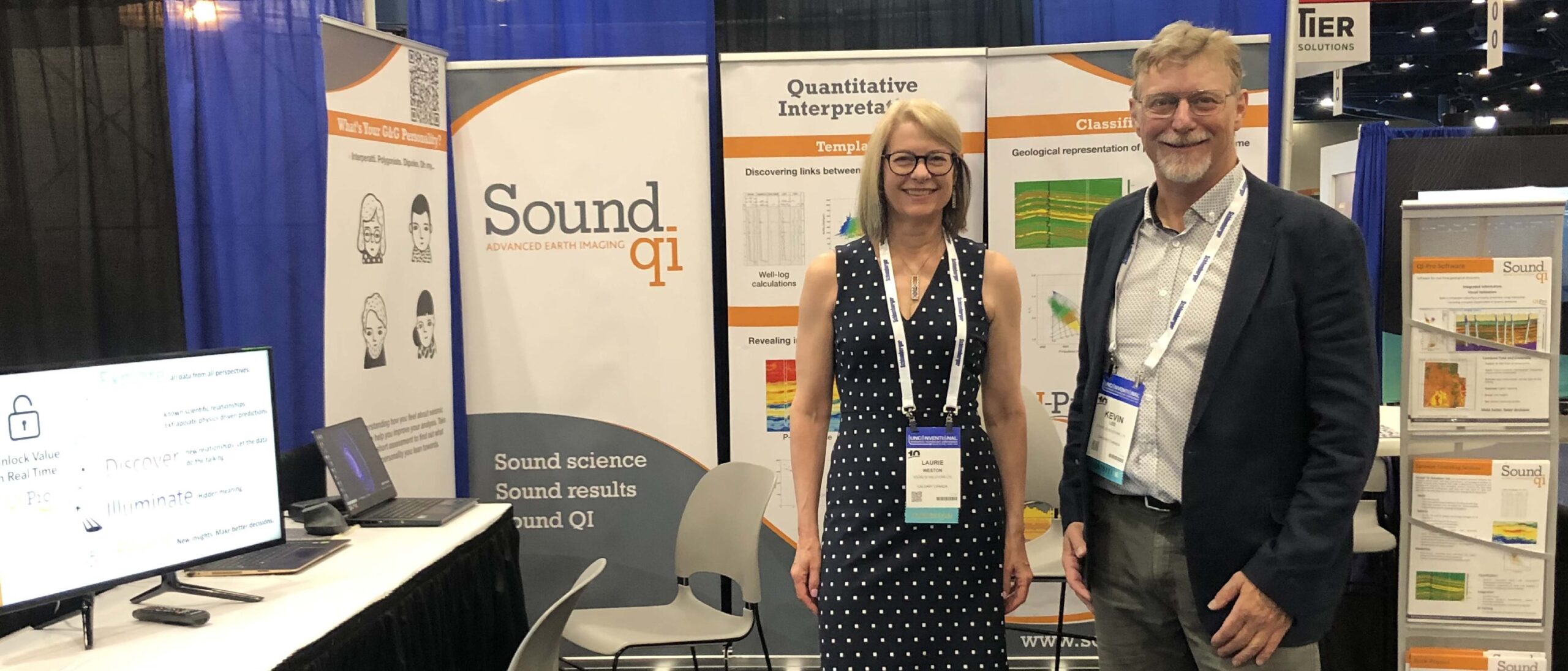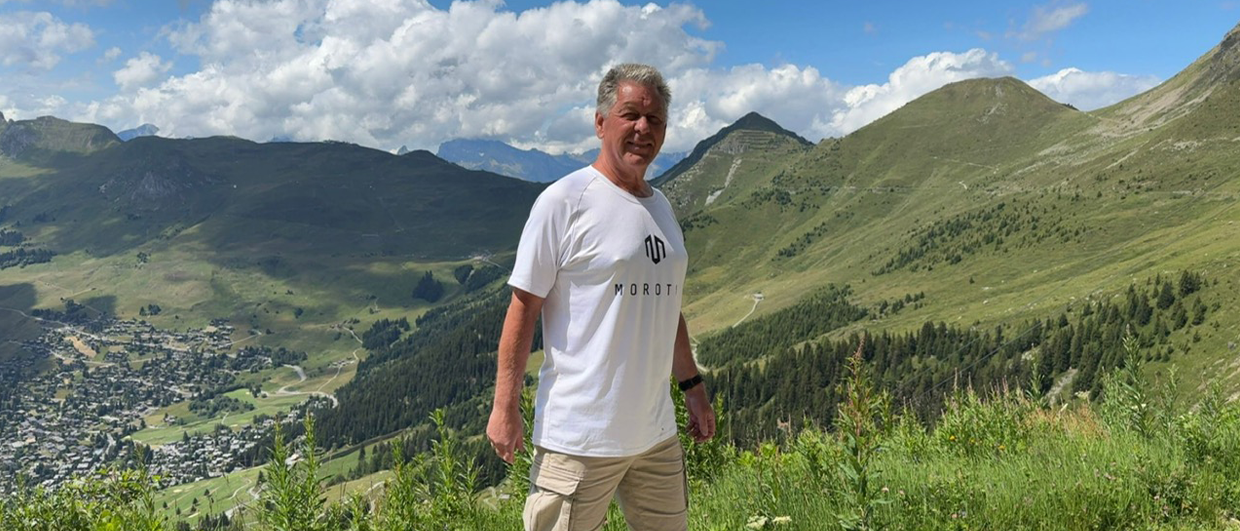Executive Vice President of Exploration for Shell, Ceri Powell, talks to us about her life and career – and how it felt to be described (in Fortune Magazine) as the 21st most powerful woman in the world.
Growing up in Pembrokeshire in south-west Wales, a young Ceri Powell was inspired by the wonderful geology all around her. “It’s an area of astonishing geology, some of the most diverse in the whole of Europe in such a small area,” she explains. “Volcanics, clastics, carbonates – we have them all. And luckily for me, my school had geology on the curriculum, and an inspirational teacher.” Add to that a father who was a manager at the huge refinery at nearby Milford Haven and also Chairman of the Pembrokeshire National Park Authority, demonstrating that industry and nature can go hand in hand: Ceri’s future career as an oil industry geologist seemed inevitable.
Executive VP of Exploration for Shell, Ceri Powell. (Source: Shell)
Inversion Tectonics
“I studied for my undergraduate degree at the University of Liverpool, where I was primarily attracted to structural and igneous geology – I didn’t have much interest in sediments in those days,” she says. “The course included lots of fieldwork, which is so important.”
Ceri visiting the oil sands sites in Canada. (Source: Ceri Powell)
Ceri went on to do a Shell-sponsored Ph.D. at Cardiff University, studying inversion tectonics and the reactivation of faults as thrusts. As she says, this was ground-breaking work at the time. “It was a very new concept, and needed to be tested in many different places throughout the world, so my field research was in the Pyrenees, the Swiss Alps and the Rocky Mountains. It was an exciting time in structural geology, with a lot of new thinking around the subject. In parallel, the oil and gas industry was starting to realise that the Southern North Sea was a reactivated basin and its structure was not as simple as had originally been thought, so there was a link to my future career even then.
“Shell encouraging me in this project was typical of the broad and innovative approach the company still likes to take, and it is very important that the oil and gas industry funds this type of research,” she continues. “Shell sponsors a number of Ph.D. students each year and we think it is an excellent training for future executives, as it teaches you how to manage a large scale project within a limited timeframe. You also need to be a self-starter, which is something we look for in an employee; we need to be able to send someone out to, say, Pakistan or Colombia and know that they will be able to run a project from scratch.
“When I finished my doctorate, I didn’t have to work for Shell, even though they had agreed to offer me a job – but I had been interviewed by the company at undergraduate level and had liked what I saw. When I arrived for my first postgraduate interview with them, the interviewer turned out to be the renowned Dr Peter Zeigler and I spent the next four hours discussing the Moine Thrust with him. He was an inspirational man – I thought to myself ‘if this is the level of technical excellence in the oil and gas world, then I want to be part of it’.”
Ceri loves Scotland, with the Isle of Skye being a particular favourite. (Source: Ceri Powell)
Moving Round the Oil Patch
Ceri’s first job with Shell was as a regional geologist in the Central and Southern North Sea and within a few months she found herself on a rig, drilling a well on a location which she had worked up and proposed. “At Shell we believe that everyone should have a good knowledge of working in the field and a grounding in the range of skills that is required in exploration,” she says. “Arriving at a rig which was drilling where I had identified a prospect so early in my career helped instill accountability – even though it turned out to be a dry hole!
“My next role was with the Angola team in The Hague,” Ceri continues. “In Shell, small regional groups like these are like little companies, where everyone helps out at all tasks, and I learnt a lot from the experience, and especially as a contrast to the large North Sea team. You have to work well together and learn to take fast decisions, often collaborating with your partner companies. In some respects we are competitors, but we are also on the same team and we’re all geologists with the same aim in the end. In Angola we had to focus strongly on health and safety, as there was little backup in Luanda if there had been an accident.”
The next move was to Miri, in the Malaysian part of Borneo, a town at the time described by the Lonely Planet Guide as “full of oil industry expatriates and prostitutes”! Ceri was in charge of the technical and commercial team, looking to follow up on the success of Shell’s large offshore gas discoveries. This turned out to be a very interesting experience, as Ceri explains. “Miri was a small town so I spent my weekends visiting my Malaysian colleagues and their families in traditional longhouses in the rain forest – amazing; I made life-long friends!”
Ceri and her husband Ajay (right), also a senior manager in Shell, on a site visit in Oman. (Source: Shell)
New Challenges
In 2000 Ceri moved out of exploration and took up a new challenge in charge of Shell’s Competitive Intelligence Team at the Head Office, which had been set up in the aftermath of the late 1990s downturn and the mergers of oil giants (like Exxon and Mobil) which accompanied it. “Our task was to try to identify what the industry would do next. What plays would the competition go after? What geology was ‘hot’? We spotted very early on trends such as national oil companies moving into international exploration. Nowadays, all companies routinely do this research, but it was very radical at the time,” she explains. “It’s strange to think it now, but that was in the very first days of the internet, and I think there had been less ‘worldwide thinking’ in the world of work. It was very exciting. I had a very young team – all under 30 except me – and sometimes the result of our analysis meant that I had to inform the senior management that Shell’s strategy was going wrong.
Still enjoying geological holidays. Ceri in Utah. (Source: Ceri Powell)
“I then spent a couple of years as business advisor to the Upstream CEO. These two strategic roles fitted in well, with Shell ensuring that I had a wide range of experience to advance my career confidently. This approach to employees’ progress and welfare had been one of the things which had initially attracted me to the company.
“I really enjoyed being in Competitive Intelligence and ‘bag-carrying’ for a senior leader,” Ceri says, “but I missed the technical rigour of practical exploration, so I was delighted to be invited back into it as VP for Exploration in the Middle East, Caspian and South Asia.” This meant a move to Dubai and yet more interesting challenges, including being on the board of a joint venture in Saudi Arabia – the first woman in such a post – and having to give a talk to a room full of 1,000 men.
“The authorities in Saudi were very supportive as they are keen for more young women to take up careers in the industry and they thought that I would be a good example to young Saudis. I met many impressive young females in my five years in Dubai, and I found it very interesting talking to them, trying to understand the issues they were facing and to help them in their career. I think it is important for managers at VP level to foster the younger generation; it’s a real opportunity to make a difference.” One such woman mentored and advised by Ceri was Intisaar Al Kindy, who was profiled in GEO ExPro Vol. 12, No. 6.
“I have never been aware of a ‘glass ceiling’ in my career,” Ceri continues, “even in the places where you would most expect it. I have always felt respect from colleagues, management, commercial partners and government representatives.”
Ceri with students at Heriot-Watt University. (Source: Shell)
Asking the Right Questions
Ceri diving. (Source: Ceri Powell)
In 2008 the CEO of Shell asked Ceri to run the company’s strategy department, covering a range of activities including refining and petrochemicals, a move designed to further broaden her skills as a leader. “I learnt how to ask the right question when I didn’t know the precise science – a vital senior management skill,” Ceri explains. “The right question, to the right people, at the right time, in order to move the business forward.”
This has propelled Ceri ultimately into her present role, as Executive Vice President Exploration, with nearly a thousand staff, a multi-billion-dollar annual budget and global accountability for exploration operations and new business opportunities worldwide. Since 2013 this role has also included being the Global Functional Head of Exploration. With this remit, Ceri has very clear ideas on ensuring that Shell is maximising the brain-power of the professionals available.
“We work in a very innovative and intelligent industry, with a high number of brain cells required to extract each barrel of oil. We must therefore attract and retain the best talent and make sure everyone is able to perform to the best of their ability,” she says. “Sometimes that means looking at the life/work balance and offering flexible working – with modern communications, tailoring work to suit the individual is totally feasible for any size of company. I’m not just talking about people with families but also, for example, elite sportsmen and women, and older employees near the end of their careers – part time includes working for six weeks at a time then taking a month or two off to pursue other interests.”
Ceri and Ajay exploring in Oman. (Source: Ceri Powell)
Sustainability and Success
“I also feel responsible for ensuring sustainability, recognising that we are part of the global community,” Ceri continues. ”Any energy company is responsible for extracting and producing hydrocarbons in the most sustainable way possible. I feel very fortunate to have been active on the Advisory Board of the United Nations Sustainable Energy for All initiative, chaired by the Secretary General of the UN. It’s a facilitator for change and the UN’s long-term view, looking ahead to 2040, fits in well with Shell’s strategic viewpoint.”
In 2013 and 2014, Ceri Powell appeared in Fortune Magazine’s list of the 50 most powerful women in business – quite an accolade! How does she feel about that?
“Do I feel powerful? Well, I feel responsible – for the safety of all the people working for me, and for ensuring we deliver within our budget and produce good results. I feel more lucky than powerful; after 26 years in this industry, I am still excited by geology – by looking at cross-sections and maps, and at rocks in the field. I still make sure there is time for site visits, as I think it is very important that you ‘keep your hand in’ on the practical side to ensure you make the right decisions. Exploration is about gut feel as well as science, so it is important that I continue to hone my geological skill set.
“How do you define power or success?” Ceri concludes. “ Knowing that I have inspired just one female to take up geology – that’s what I consider success!”
Ceri loves her garden in the Cotswolds. (Source: Ceri Powell)





